| Volvo B9TL | |
| Manufacturer | Volvo Buses |
| Bodywork | ComfortDelGro Engineering Wrightbus Limited Gemilang Coachworks |
| Years in operation | 2006 – Present |
| Operators | SBS Transit SMRT Buses Tower Transit Go-Ahead Singapore |
| Technical Data | |
| Length | 12 metre |
| Engine | Volvo D9A300 EM-EC01 Volvo D9B310 EC06B |
| Transmission | Voith DIWA 864.3 Voith DIWA 864.5 ZF Ecomat 6HP 602 ZF EcoLife 6AP 1410B |
| Accessibility | Low Entry / Low Floor |
| Emission Standard | Euro III / V (SCR) |
The Volvo B9TL (Bus chassis, 9-litre Transverse-mounted engine, Low floor) is a rear-engined low-floor double-decker city bus built by Volvo Buses since 2002. It is the successor to the older Volvo B10TL “Super Olympian” and the Volvo B7TL. The bus is popular in the United Kingdom, Hong Kong and Singapore, and is currently the single most common model of city bus in Singapore.
SBS Transit was previously the main operator of the Volvo B9TL in Singapore, having initiated orders and operated over 1500 units at its peak (before the BCM kicked in) as its primary double-decker bus model. In 2006, the first 200 Euro-III units were brought in (bodied locally by ComfortDelgro Engineering). In 2010, an initial batch of 150 Euro-V buses with Wright Eclipse Gemini II bodywork was brought in.
Additional bulk orders for hundreds of buses were made in the subsequent years, including 176 more buses of identical specifications ordered by the Land Transport Authority to kickstart the Bus Contracting Model. In total, 1606 units of Wright Eclipse Gemini II-bodied Volvo B9TLs were brought into Singapore.
In 2016, under the Bus Contracting Model, the Land Transport Authority has leased Volvo B9TL buses (built to SBS Transit specifications) to Tower Transit, Go-Ahead Singapore as well as SMRT Buses.
In addition, a single prototype unit bodied by Gemilang Coachworks Malaysia was delivered to SBS Transit in 2014 and registered as SBS7777Y.
Design:
The Volvo B9TL was built to succeed the 2-axle Volvo B7TL and the 3-axle Volvo B10TL “Super Olympian” chassis, and was designed based on the existing Volvo B7TL. A key difference from its B7TL and B10TL predecessors is its new 9.3-liter engine originally designed by Renault Trucks. The larger engine delivers more horsepower, an advantage over the Volvo B10TL which was notorious for its poor performance on steep ascents. Another major design change over the B10TL was the relocation of the water tank from the front of the bus (near the right front wheel) to the rear, next to engine components.
The B9TL was initially offered only in a 12-meter 3-axle format. The 2-axle variant was introduced in 2006 to fully replace the B7TL, with various chassis lengths available (10.3m, 10.4m and 10.6m).
For engine options, the Euro III-compliant Volvo D9A engine (rated at 300 or 340 horsepower) was initially offered and later replaced by the Euro V-compliant Volvo D9B engine. The latter relies on Selective Catalytic Reduction (SCR) technology, requiring diesel additive fluids such as AdBlue. Two versions were offered – the D9B260 rated at 260-horsepower for the 2-axle version, and a higher powered D9B310, rated at 310-horsepower, for the 3-axle version. Transmission options include a ZF 5/6-speed gearbox or a Voith 4-speed gearbox. Wheel rims are typically supplied by Alcoa.
The Volvo B9TL – A quick summary
SBS Transit introduced the Volvo B9TL to Singapore with the first 200 Euro-III units entering service from 2006, bodied by ComfortDelgro Engineering (the engineering branch of SBS Transit’s parent company).
Later on, Euro-V Volvo B9TL buses bodied with the Wright Eclipse Gemini II bodywork would be delivered in very large numbers and emerge as the most common bus model on Singapore roads. An initial batch of 150 entered service from late 2010, followed by additional bulk orders made in the subsequent years, bringing up to a grand total of over 1400 Wright-bodied Volvo B9TL buses. In between these orders, the Land Transport Authority (LTA) began purchasing some of these buses for the Bus Service Enhancement Programme (BSEP), although these buses continued to remain with SBS Transit.
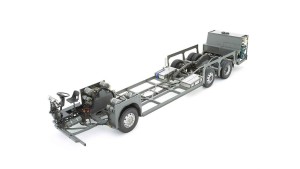
In December 2015, the LTA bought out SBS Transit’s contract for any remaining B9TL WEG2s yet to be delivered. Combined with the BSEP fleet, these new LTA-owned buses were leased to other bus operators as part of the Bus Contracting Model (BCM). As a result, these buses (originally built to SBS Transit specifications) found their way into the fleets of other local operators such as Tower Transit, Go-Ahead and SMRT Buses.
In addition, a single prototype unit bodied by Gemilang Coachworks Malaysia was delivered to SBS Transit in 2014 and registered as SBS7777Y. No further units were procured. Except for prototype units SBS7500D and SBS7777Y, all Volvo B9TLs (Euro-III and Euro-V) have been assembled in Singapore.
Volvo B9TL (Euro III) – ComfortDelGro Engineering bodywork
Main Article: Volvo B9TL (CDGE)
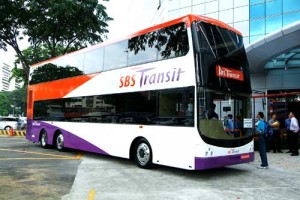
In late 2004, SBS Transit placed orders for 150 Euro III Volvo B9TL chassis at a cost of S$71 million on 28 December 2004, with an option for 50 more units. They were bodied by ComfortDelGro Engineering (CDGE), the engineering branch of SBS Transit’s parent company ComfortDelGro. An early prototype of the bodywork, developed by SBS in cooperation with PSV International, was fitted to a Volvo B10TL (SBS9889U). All Euro III Volvo B9TLs would be fitted with a variation of this bodywork. A similar version of this bodywork was thus developed for the Volvo B9TLto be new bodywork was ready to be refitted for use on the Volvo B9TL.
On 15 February 2006, a prototype bus was unveiled, a Volvo B9TL with a zero-step entrance, a manual wheelchair ramp and other wheelchair-friendly features. As Singapore’s first Wheelchair-Accessible Bus (WAB), they were going to pave the way for more WABs and a more disabled-friendly transport system. The launch date was delayed from April to June to prepare bus stops for wheelchair boarding and alighting activities. Finally, on 27 June 2006, SBS Transit Service 21 became the first wheelchair-accessible bus service with 10 Volvo B9TL CDGEs in its fleet.
Later in 2006, SBS Transit exercised its options for an additional 50 more buses at a cost of S$29 million, soon after putting its first B9TLs into operation, bringing the total fleet size to 200. These B9TLs come with the same Euro III-compliant Volvo D9A300 engine, but a four-speed Voith gearbox instead of the six-speed ZF. All units were registered just days before the government-set deadline for Euro-IV compliant diesel engines. Volvo B9TL CDGE units were registered from SBS7300P to SBS7499A.
| Basic Technical Specifications | |
| Engine | Volvo D9A300 EM-EC01 engine, 9364 cc, Euro III-compliant Power/Torque rating of 300 hp (220 kW) @ 1900 rpm / 1400 Nm @ 1100 – 1400 rpm |
| Transmission | ZF Ecomat 6HP 602 gearbox (149 units) – Six-speed automatic Voith DIWA 864.3 gearbox (50 units) – Four-speed automatic ZF EcoLife 6AP 1410B gearbox (1 unit) – Six-speed automatic |
| Bodywork | PSV International / ComfortDelGro Engineering Bodywork Assembled by ComfortDelGro Engineering |
| EDS | LECIP Electronic Display Sign (EDS) Orange LED matrix mounted on front, side and rear Formerly using plastic destination signs on front, side and rear |
| Additional Features | · SMC Transit doors Double-leaf entrance, double swinging plug exit |
| Licensed Capacity | Seating (Upper deck): 53 | Seating (Lower deck): 27 | Standing: 44 | Total: 124 |
Unlike most SBS (or CDGE) assembled buses which have their bodywork kits shipped in completely knocked down (CKD) form, CDGE bodied these buses themselves from the chassis up, hence these buses were fully constructed in Singapore. The Government had subsidised the cost of fitting the bus with wheelchair-friendly features, such as the manually operated wheelchair ramps. Each bus has one wheelchair bay.
The Volvo B9TL CDGE has a licensed passenger capacity of 124 passengers, consisting of 53 upper deck seating, 27 lower deck seating and 44 standing passengers. An interesting feature at the upper deck is two rows of three longitudinal aisle-facing seats, located in front of the rearmost row of seats.
The bus was also equipped with safety features such as throttle interlocking, which prevents the bus from moving off when doors are opened. Doors will not open above 5 km/h nor close if the wheelchair ramp is still deployed. Additional blinkers on the offside of the bus make the bus more visible to oncoming traffic as it exits a bus bay.
On 7 March 2010, SBS7440T from service 25 was burnt beyond repair in a fire at Ang Mo Kio Bus Depot. It was de-registered several months later, making it the first Volvo B9TL in Singapore to be de-registered.
Additional Features:
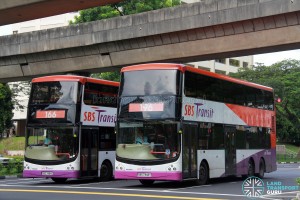
In 2011, SBS Transit replaced the traditional plastic destination plates with Electronic Display Signages (EDS) by LECIP on their Volvo B9TL CDGE buses. SBS7392Z was the first bus to be retrofitted, and all other CDGE B9TL buses followed suit. The upgrade consists of three sets of electronic displays, for the front, side and rear of the bus. The new LECIP EDS units had route numbers that were smaller than that of the plastic destination signs that they replaced; however, this allowed SBS Transit to accelerate the phasing-out of plastic destination signs.
Bus Transmissions:
SBS7321D had its ZF 6HP602 gearbox replaced with a ZF EcoLife 6AP 1410B gearbox for reasons unknown. The same make of gearbox is fitted to ZF Volvo B9TL Wrights.
| Volvo B9TL CDGE transmission | |
| ZF Ecomat 6HP 602 | SBS7300P – SBS7341X, SBS7347E – SBS7402D, SBS7448Y – SBS7499A, excluding SBS7321D |
| Voith DIWA 864.3 | SBS7342T – SBS7346H, SBS7403B – SBS7447A |
| ZF EcoLife 6AP 1410B | SBS7321D |
Refurbishment / Lush Green Livery:
The first Volvo B9TL CDGE to be repainted to Lush Green was SBS7368U, which returned to revenue service on 6 October 2018. Repainting of the remaining 198 buses was completed in late September 2019, with the exception of SBS7428E which returned to service in December 2019 following an accident a year prior.
Mid-life refurbishment of these buses was also carried out around the same timeframe (2018-2019 period). This included:
- New floorboard covering
- New seat covers and upholstery
- Repainted grab poles, stanchion poles and interior panels
- Original transparent handgrips with advertising space replaced with conventional ones
- Upgraded CCTV system with HD cameras
- Replaced interior lights
While initial units were refurbished with yellow seat covers, subsequent buses were refurbished with red seat covers commonly found on other SBS Transit bus models.
Early Retirement (2021/2022)
In March 2021, 34 Volvo B9TL (CDGE) buses were retired early, despite having undergone refurbishment work less than 3 years prior and a lifespan of 15 years (out of their 17-year statutory lifespan). The early retirement of these buses is believed to be linked to the Early Turnover Scheme, where the Government incentivizes businesses to replace their older diesel vehicles with newer ones that meet the latest emission standards. All 34 buses were replaced with MAN A95 (Euro 6) – Batch 2 buses.
On 1 January 2022, SBS Transit (SBST) retired the bulk of its Volvo B9TL (CDGE) fleet, comprising 144 buses. As part of a deal with LTA involving the transition of the Downtown Line to the to the New Rail Financing Framework (Version 2), SBST had agreed to replace 241 of its own buses (comprising 144 double-decker buses and 97-single-deck buses) with newer government-owned buses, which are more environmentally friendly and cost-efficient to maintain. All 144 double-deck buses specified in the deal were Volvo B9TL (CDGE) buses.
Following this mass retirement, as of early 2022, there are only 20 buses left on revenue service, distributed among Ang Mo Kio Depot, Bedok North Depot, and Bukit Batok Bus Depot. A further two units remain allocated to Hougang Bus Depot for training duties (SBS7383A & SBS7385U).
Full Retirement
All remaining buses were de-registered by September 2023 as these buses reach their statutory lifespan.
Main Article: Volvo B9TL (CDGE)
Page 2 & 3: Volvo B9TL (Wright)
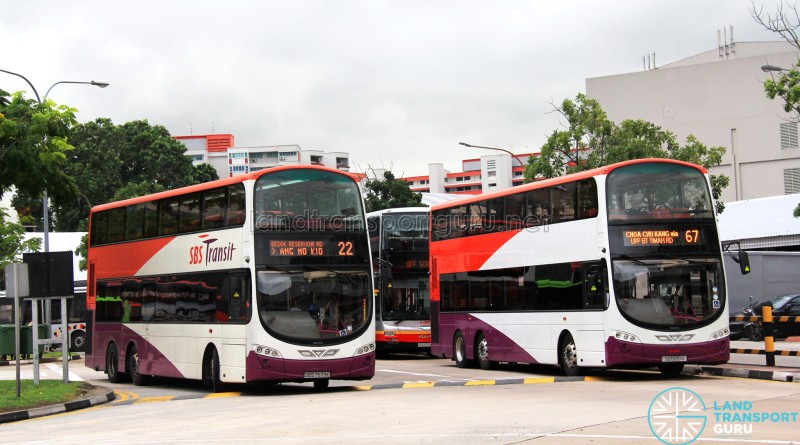
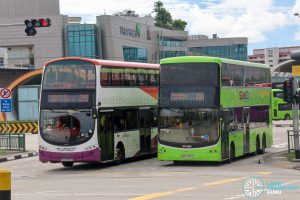
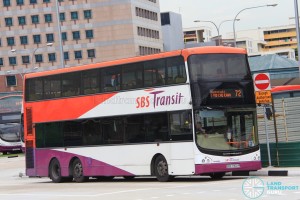
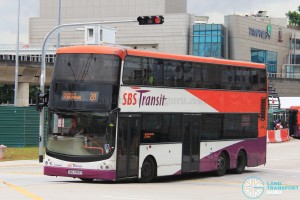
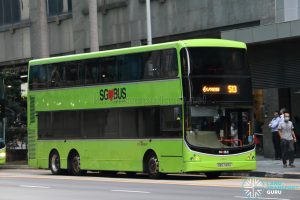
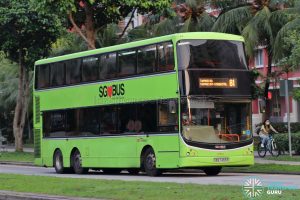
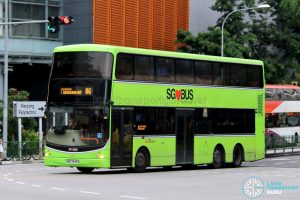
SBS3189X was also the Batch 2 bus with Hanover EDS